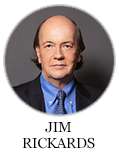Aussies have been robbed.
There’s the central bank playing with interest rates…
…our banks lending to anything with bricks and a patch of dirt…
…tax breaks offered for passive investments like housing…
…and the promise of a long retirement with professional money managers looking after our super pots…
All of this, is meant to make us feel safe. Like our financial future is taken care of, because there are people that know more than us…taking care of our money.
Yet, in between all of these promises, government legislation, and central banks overseeing the value of our currency, we’ve lost the connection to what real wealth is.
Wall Street Insider Shares His Wealth Preservation Tactics. Click here to learn more.
Understanding what real wealth is…
This outsourcing of our own financial management has denied us the ability to develop our financial literacy.
A crucial part of understanding your finances is understanding what real money is — and that’s gold.
Gold is a critical part of long-term wealth protection. Except it hasn’t been taught in any economic classes since the early 1970s.
That means there are two generations of economists and money mangers running around that don’t understand the place gold holds in personal wealth.
And this is what I set out to change, with my latest service, Rock Stock Insider.
I’ve been in various cities around the world in the past 12 months — interviewing some of the foremost authorities on money.
Every single interviewee I have spoken to — from a private money man who manages elites’ money to big name global analysts — advocates for understanding gold.
When asked what the one thing Australians need to know is, they often have a similar answer: read history.
Gold has been money for thousands of years. Paper money has never lasted…
Today, Jim points out that many billionaires advocate owning stocks or bonds…but rarely do they admit they’re buying or holding gold.
Read on for more.
| Until next time, |
| Shae Russell, |
Censorship and Propaganda for the 2020s
 |
I’m sure you’ve seen plenty of billionaire hedge fund managers on business TV or streaming live from Davos.
They like to discuss their investments in Apple, Amazon, US Treasury notes, and other stocks and bonds.
They love to ‘talk their book’ in the hope that other investors will piggyback on their trades, run up the price, and produce more profits for them.
Yet the only thing they almost never discuss in public is gold.
Why have gold when stocks and bonds are so wonderful?
I worked on Wall Street and in the hedge fund industry for decades.
I also lived among the players in New York and Greenwich, Connecticut at the same time.
I’ve met the top hedge fund gurus in private settings. Some are clients. Some are friends.
I’ve never met one who doesn’t have a large hoard of physical gold stored safely in a nonbank vault.
Of course, they won’t say so on TV because they don’t want to spook retail investors into dumping their stocks and bonds.
This article makes the same point I am. In the article, Goldman Sachs states plainly:
‘If an individual is trying to minimise the risks of sanctions or wealth taxes, then buying physical gold bars and storing them in a vault, where it is more difficult for governments to reach them, makes sense.’
I agree with that.
What I don’t understand is why everyday citizens don’t do the same thing.
If gold bullion is the go-to asset for billionaires, why don’t small investors have at least a 10% allocation to gold and silver bullion just in case?
Some do, but most don’t.
They’ll find out the hard way what individuals have learned over centuries and millennia.
Gold preserves wealth; paper assets do not.
Elites yearn for control of the media
A recent Project Syndicate, was called ‘How Trolls Overran the Public Square’. But a better title might be, ‘How Globalists Lost Control of the Media’.
The article is written by J Bradford DeLong.
Brad is one of the most prominent mainstream economists, a conventional neo-Keynesian who bows down to icons such as Paul Krugman and Larry Summers.
He’s a professor at Berkeley and a former Treasury Department official in the Clinton administration. DeLong has not won the Nobel Prize in economics (like Krugman), but he’s probably on the short list to win it one of these days.
That’s not exactly an endorsement of his views considering that over one-third of the Nobel Prizes in economics have been awarded for false science such as the ‘efficient-market hypothesis’ and a capital markets allocation model based on a ‘risk-free rate’ (there isn’t one, because no assets are risk-free).
DeLong pretends to complain about ‘trolls’ on Twitter and other social media channels who challenge his mainstream thinking.
As he puts it, ‘The current public sphere does not serve us well.’ That’s what DeLong says, but that’s not what he really means.
DeLong wants a return to the media landscape of the 1960s, 1970s, and 1980s.
That’s when everyday citizens had no voice, and communication was controlled by three TV networks (CBS, ABC, and NBC) and a handful of newspapers and magazines (Time, The New York Times, The Washington Post, and the Los Angeles Times).
Those channels only allowed approved individuals to express their views.
Approval was based on correct thinking (Keynes is good, Hayek is bad) and correct policies (higher taxes are good, tax cuts are bad).
In a world like that, DeLong would have a big megaphone and no criticism.
Instead, his false theories and out-of-date models are criticised all day long by creative analysts on the internet.
Too bad for DeLong, but great news for the rest of us.
| All the best, |
 |
| Jim Rickards, |
PS: Discover the easiest way to start investing in gold in Australia. In fact, it’s as easy as buying a book on Amazon! Click here to read the FREE report.


Comments